It’s no secret that Nigeria remains a force to be reckoned with as far as producing world class athletes is concerned, be it within the shores of the country or without. At a time when the country is turning to foreigners to help compete, Making of Champions has identified five young athletes that can make a difference for Team Nigeria at the 2016 Olympics in Rio.
1. MOROLAKE AKINOSUN
The 20 year old who competes for the University of Texas has not looked back since winning the 100m at the USA Junior Championships in 2013 while she finished as runner-up in the 200m.
She started 2014 on a high note as she grabbed FOUR Big 12 titles for her school’s Athletics team, recording victories in 60m Indoor Championships, as well as the 100m, 200m and 4x100m during the outdoor season.
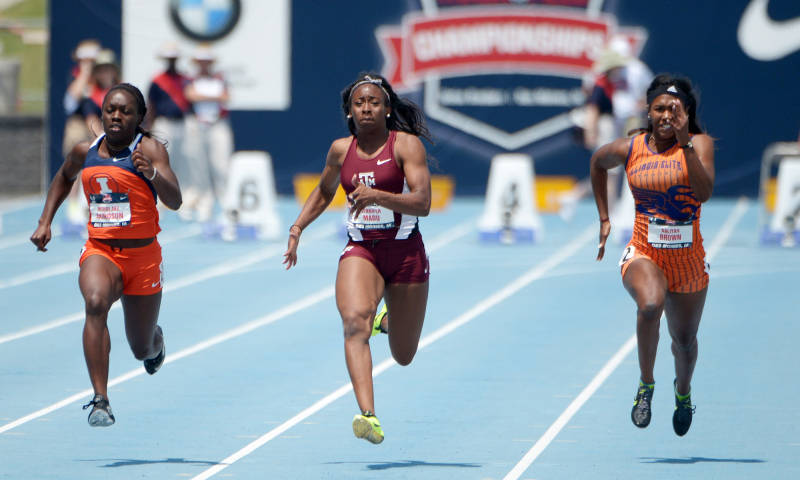
(Photo Credit: Texas A&M Athletics)
At the 2014 NCAA Outdoor Championships, Akinosun placed 2nd in the 100m and 5th in the 200m. She thereafter competed in the 4x400m as a member of the GOLD winning team that clocked 3:24.21s, which happened to be a Meeting Record (MR) and also the 2nd-fastest time in collegiate history. She capped off an outstanding season with a semifinal finish at the USA Championships, finishing 10th overall.
Akinosun has a Personal best (PB) of 11.04s in the 100m and 22.68m in the 200m. The young sprinter was tied in 16th place in the 2014 World Rankings alongside Veronica Campbell-Brown and Murielle Ahouré. However, she will find it quite a task breaking into the US National team ahead of the Rio Games as she falls behind the likes 2014 World Leader, Tori Bowie (10.80s), Tianna Bartoletta (5th with 10.92s) and English Gardner (8th with 11.01s) in the pecking order. She is ranked 23rd in the 200m (22.68s).
Akinosun (2nd Right) was a member of Team USA’s 4x100m women squad that won the Pan American Junior Championships in 2013. (Photo Credit: www.nationalscholastic.org)The reverse is however the case as far as securing a place in the Nigerian team is concerned as only National, African and Commonwealth Champion, Blessing Okagbare ranks higher with a time of 10.85s, which was the second fastest time in 2014. Okabare’s closest contender, Gloria Asumnu is ranked 37th with a time of 11.15s. The presence of Akinosun, who still has age on her side, in the Nigerian team, will no doubt enhance the competitiveness of the team.
2. COURTNEY OKOLO
400m runner, Okolo took the 2014 Athletics season by storm as she won the Big 12 Outdoors in an outstanding time of 50.03s in June, breaking the NCAA record set in 2005 by UCLA’s Monique Henderson in the process. This makes her one of only two women in outdoor collegiate history to have recorded two current all-time Top 5 performances in the 400m.
The 20-year old was instrumental to the Longhorns’ victory in the 4x400m at the NCAA Championships with a 49.57s anchor split, which earned the team the NCAA Meeting Record (MR) of 3:24.21s. She also won the 4x400m at the Penn Relays with another MR of 3:26.38s, where she split 49.7s.
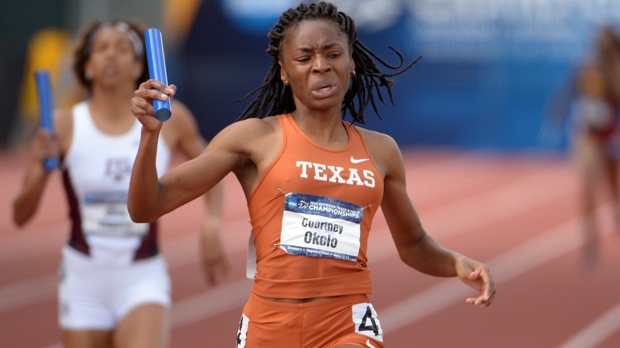
(Photo Credit: www.flotrack.org)
Okolo’s fantastic form earned her a nomination for the Bowerman Award, which is regarded as the most prestigious award in collegiate Track and Field and named after legendary Oregon coach Bill Bowerman. She was however beaten to the crown by Laura Roesler of Oregon.
Okolo’s PB ranked her as the third fastest woman in the world in the 400m in 2014, only behind Team USA compatriots, World Leader Francena McCorory (49.48s) and Olympic champion, Sanya Richards-Ross (49.66s). This means that she would be Nigeria’s first choice in the quartermile if she were to don the green and white colours at the Rio Olympics.
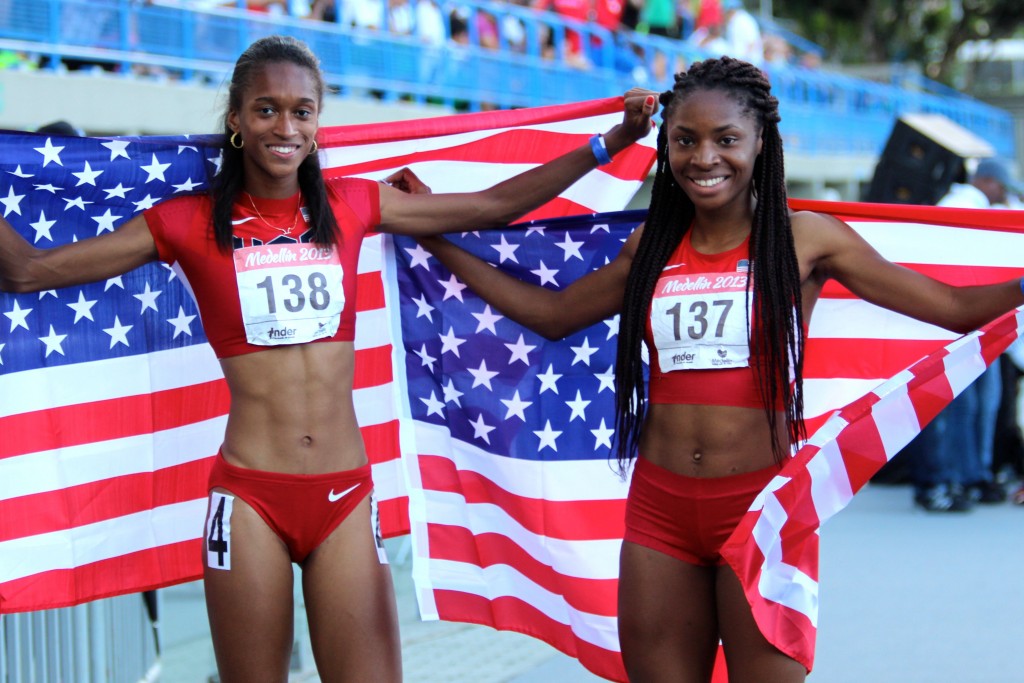
(Photo Credit: www.nationalscholastic.org)
The last time a Nigerian ran this fast was in 1999 when African Record holder, Falilat Ogunkoya ended the 1999 season as the fastest woman in the world with a time of 49.62s. She also had another impressive time of 50.04s in 2000 where she occupied the 9th spot.
Nigeria’s fastest woman in 2014 is National and African champion, Folashade Abugan who won both titles with a time of 51.21s and occupies the 23rd spot in the world, directly below Nigerian-born Kemi Adekoya (51.11s) who now runs for Bahrain.
3. OMO OSAGHAE
The 26-year old’s exploits in the 110m hurdles are not so surprising, going by his sporting background. Osaghae’s father played football while his brother, Tim played college football with Texas Tech University, the same institution the hurdler eventually attended.
Osaghae has a PB of 13.23s set in 2011, and won his third National title at the 2014 USA Indoor Championships where he took the men’s 60m hurdles in a photo finish with a time of 7.56s, edging out Terrence Trammell and Dominic Berger, who both also recorded the same time.
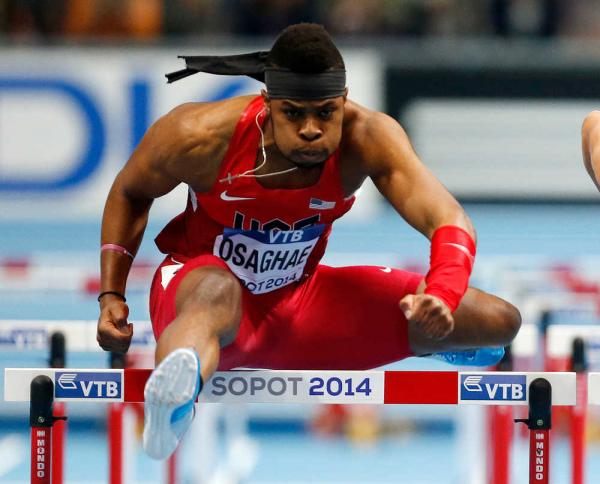
(Photo Credit: AP /Petr David Josek)
He thereafter continued his 2014 campaign in grand style as he dominated the semis of the 60m hurdles at the IAAF World Indoor Championships in Sopot, winning with 7.49s. He posted a surprising victory in the final, beating the more favoured Pascal Martinot-Lagarde with a PB of 7.45s. The Frenchman took Silver in 7.46s. In spite of these exploits, Osaghae wasn’t able to replicate the same performance at the outdoor season as he competed in a few meetings at the IAAF Diamond League without securing a win.
His Season’s Best (SB) of 13.41s places him on the 32nd spot on the 2014 Top Lists, which ranks him a distant 23rd in the US. Compatriot, Ronnie Ash is the highest placed American on the list, occupying 3rd position with a time of 12.99s, while World Record Holder, Aries Merritt, David Oliver, and Jeff Porter are all tied in 16th place with 13.27s.
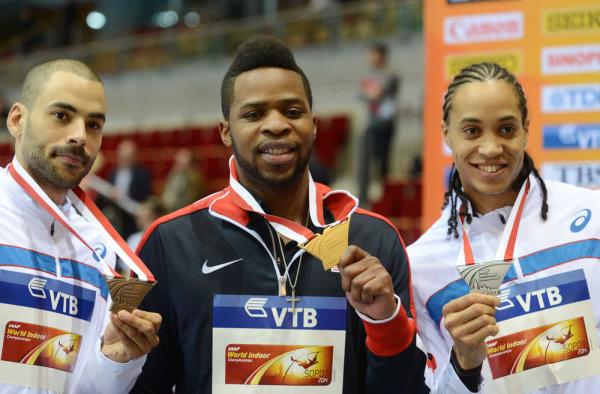
(Photo Credit: www.tc-management.com)
Should he decide to switch allegiance to Nigeria, Osaghae will enjoy the enviable position of becoming the country’s No.1 choice, since in 2014 he ran faster than 29-year old National and African Champion, Tyrone Akins who has an SB of 13.48s. Continental Silver and Bronze medalists, Alex Al-Ameen and Martins Ogierakhi posted 13.54s and 13.67s respectively and were ranked 59th and 96th in the world in 2014.
4. OLIVIA EKPONE
Texas A&M sprinter, Ekpone didn’t fare badly in 2014, having positioned herself as an integral part of her school’s team, competing in four events namely the 100m, 200m, 4x100m and 4x400m relays.
She put up a formidable performance at the Southeastern Conference in Kentucky in May where her time of 22.23s in the 200m broke A&M’s School Record, a feat that moved her atop the SEC’s all-time list.
Ekpone, a Silver Medallist at the 2012 IAAF World Junior Championships, competed at the 2014 edition in Oregon where she helped the US junior team win its fifth consecutive title in the 4x400m at the Championships with a World Junior leading time of 3:30.01s.
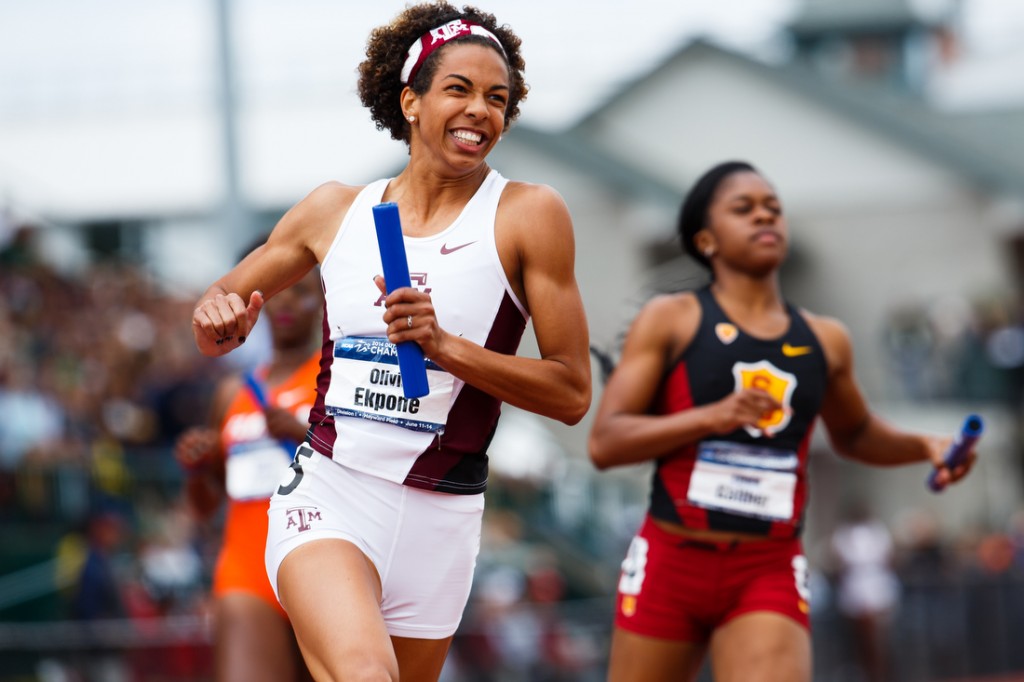
(Photo Credit: (Ryan Kang/Emerald)
The 21-year old also inspired the A&M women to their fourth Outdoor Track and Field team title at the NCAA Championships in August, winning the 4x100m in 42.80s. She thereafter teamed up with the 4x400m team to place 3rd with a School Record of 3:25.63s.
She finished 3rd in the 200m in 22.64s, making her the second A&M sprinter to occupy that position after Dominique Duncan achieved the same feat in 2012. In an amazing twist, Duncan switched allegiance to Nigeria last year, and has an African Championships Bronze medal to her name.
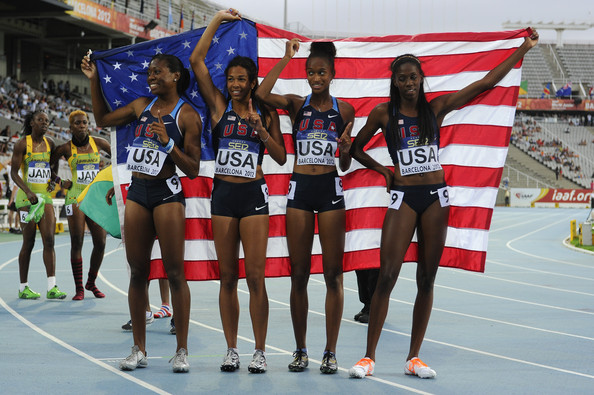
(Photo Credit: David Ramos/Getty Images Europe)
Interestingly, Ekpone was tied with Nigeria’s superstar Blessing Okagbare as the 5th fastest woman in the world in the 200m in 2014, with a time of 22.23s, meaning that Olympic champion, Allyson Felix (22.02s) and Tori Bowie (22.18s) are the only Americans who ran faster in 2014.
Her time of 11.11s in the 100m puts her on the 25th position in the Rankings, signifying that she can conveniently compete in the Sprint Double for Nigeria if she were to make a switch ahead of the 2016 Olympics. Nigeria’s second best in the 200m is Duncan who occupies the 35th spot in the 200m (22.82s).
5. CINDY OFILI
Not many athletes are blessed with the gift of having older siblings to look up to as far as their career is concerned. However Cindy Ofili falls into the privileged class of having a role model and mentor in the person of her sister, Tiffany Porter (nee Ofili).
Cindy also comes from a sporting family that saw her dad compete in football and Track and Field, while her two brothers also played football in the university. The 20-year old competes in the 100m hurdles just like her elder sister who represented the US as a junior, but began competing for Great Britain at the 2012 Olympics in London.
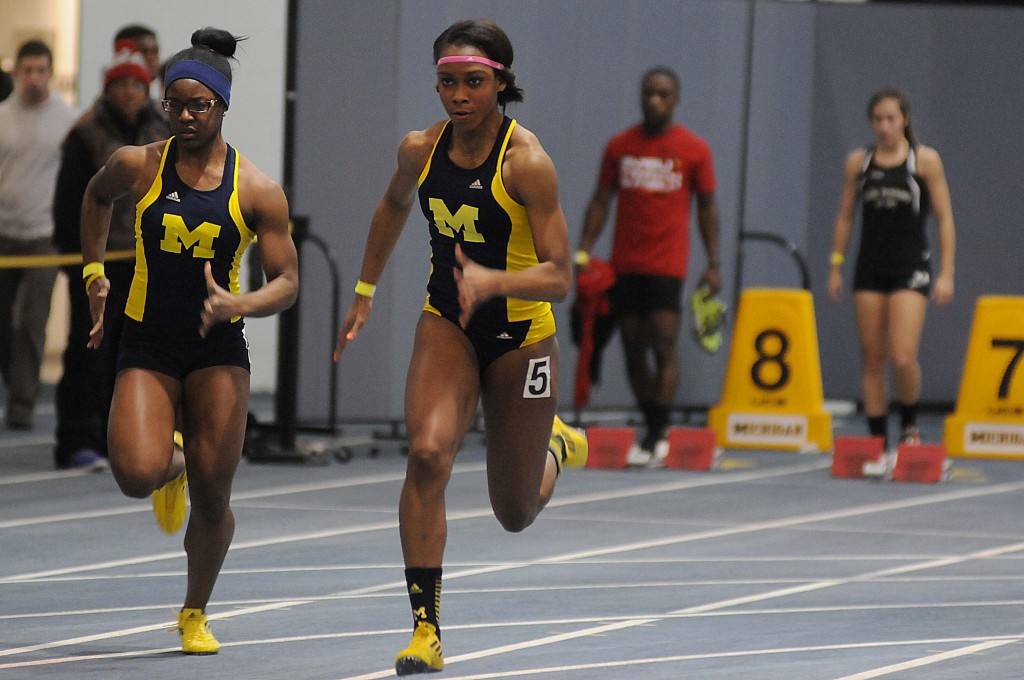
(Photo Credit: Ryan Reiss/Michigan Daily)
Ofili won the 60m hurdles at the 2014 Big Ten Championships in 8.08s and also finished third in the 60m in a School Record of 7.43s, and was named the Big Ten Indoor Track Athlete of the Year. She extended her win to the outdoor season when she won the 100m hurdles (12.93s) at the same championship in May, and finished 3rd and 5th in the 100m and 200m with 11.75s and 23.74s respectively.
Though Ofili still has age on her side, it will take some time to break into the US senior team with the likes of World Leader and Diamond League champion, Dawn Harper-Nelson holding sway (12.44s). At least nine of the Top 10 athletes in the 100m hurdles are Americans, while Ofili occupies a distant 37th place with an SB of 12.93s.
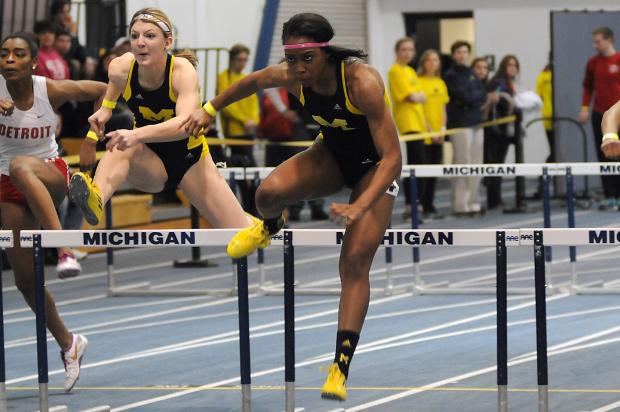
(Photo Credit: Ryan Reiss/Michigan Daily)
Her position is however miles ahead of Nigeria’s No.1 in the event, 32-year old Nicole Denby who was 112th in the 2014 world rankings with 13.20s. Next is Lindsay ‘Wenyime’ Lindley in 116th with 13.21s, while Ugonna Ndu occupies the 151st spot with a time of 13.31s.
Going by the country’s recent resolve in 2014 to go after and recruit American Athletes with questionable Nigerian roots at best, most of them with age not exactly on their side, if the country is to make any meaningful impact at the Rio 2016 Olympics, it will be a breath of fresh air to have YOUNG athletes with clear, obvious and unquestionable Nigerian parentage don the green and white colours in Brazil!
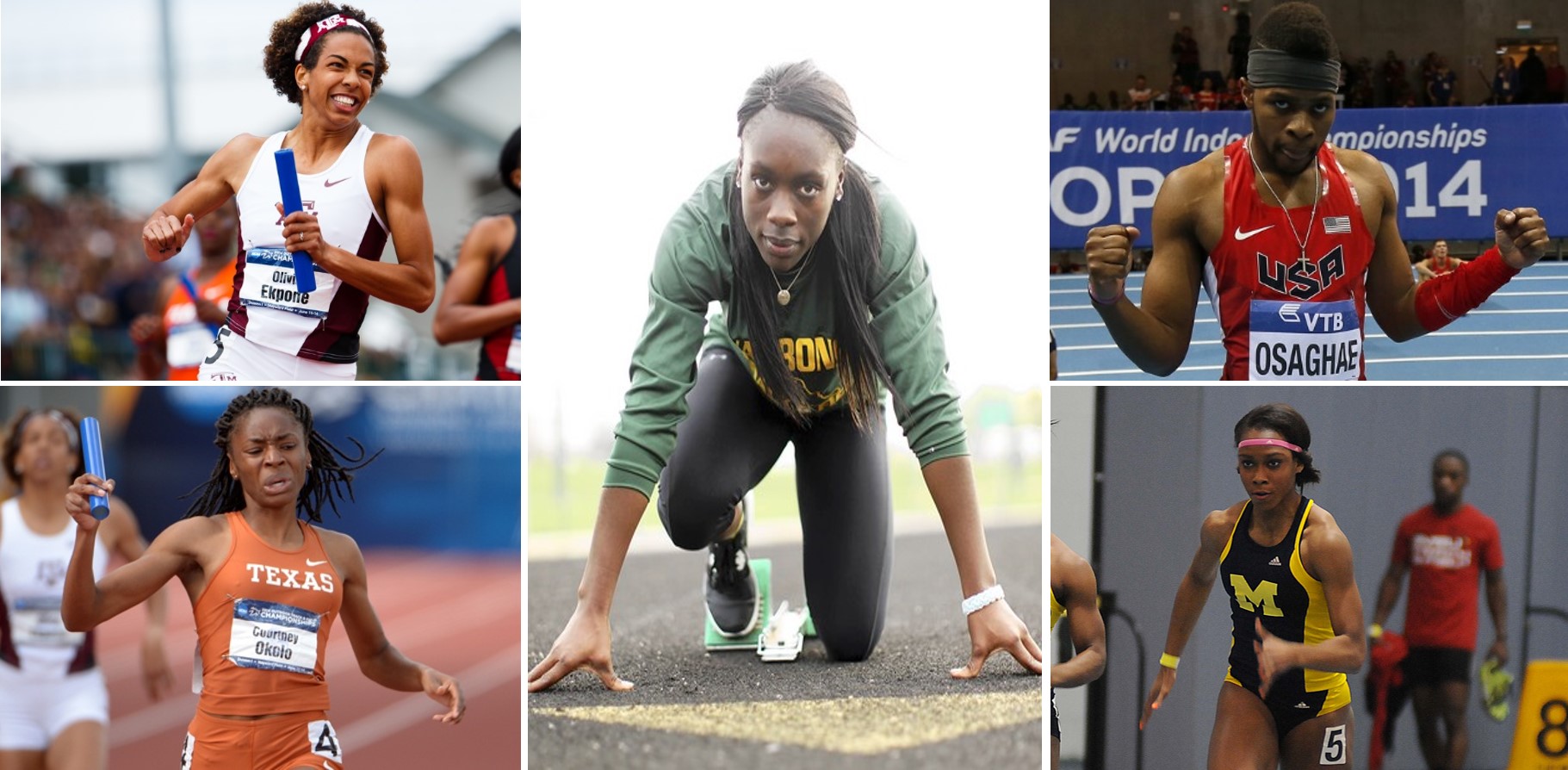
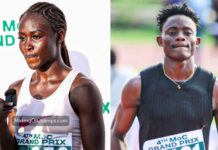
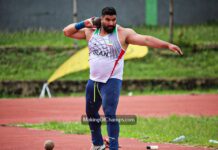
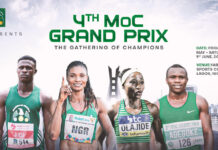


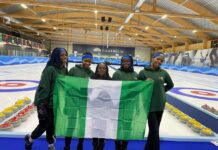
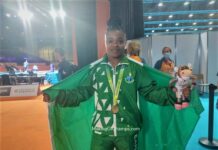
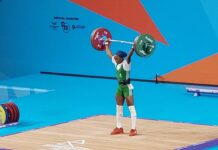
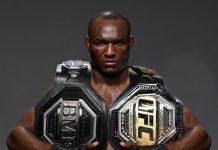








Sometimes i feel really sad when i see events like this,focused on US citizens simply because they have Nigerian parents…relegading to the background Nigerians who have done Nigeria proud in the past and is still doing so in the present.
Currently am the fastest male Nigerian sprinter in 60m indoors this year 2015 but nobody seems to take notice, no encouragement of any sort; financial or moral; it hurts me to say it but i will not hesitate to change allegiance if the situation does not improve.
This link below is the world top list 60m indoors. ..check number 78.
http://www.iaaf.org/records/toplists/sprints/60-metres/indoor/men/senior/2015
Yemi Olus,
This can’t possibly be a situation you are comfortable with. Where is the pride in having an athlete wear your colors who in most cases don’t speak your language, know your customs and have never stepped foot in your country? How can you cheer for someone you don’t even know and in their heart, they are American? Do you think it is fair and just for someone to represent a nation that has played absolutely no role in their development as an athlete and as a person? Because the current system allows it, on a moral level, that does not make it right. An athlete who was born, raised, educated and trained in one country; a country they have represented competitions; the athlete and their immediate family currently live in that country…they should not be representing another country. Besides doping and age fraud, ‘country-jumping’ is probably the biggest problem the IAAF has to deal with, and talk about it as if it is a good thing. Countries need to develop their own athletes, which Nigeria is fully capable of. There is far more pride in cheering for ‘true’ Nigerians; athletes you know; athlete whose progress who have watched since their beginning in the sport; athletes your nation has nurtured as a person and developed as an athlete, as oppose to exploiting a technicality and poaching athletes from the U.S.
There are certainly legitimate reasons in which I support, where a U.S. athlete might choose to represent another country. In fact the U.S. has benefited from a couple of those situations, but it can’t groups of athletes seeking a short cut to the Olympics and those athletes have no ‘true’ sense of being a citizen of that country.
Please note, this is not meant to disparage Nigeria or Nigerian athletics, because I say the thing about Mexico and Arab Emirate countries for example, who put together teams comprising of large numbers of nationals from other countries.
I understand your sentiments Michael. Like I stated on another platform, it is absolutely wrong to depend on foreign-based athletes to the detriment of home grown talent. At the same time athletes with dual citizenship are legally allowed to compete for the country of their choice. Why then does it have to be a mutually exclusive thing? Why not develop home grown talent while also welcoming athletes with Nigerian heritage who are willing to run for Nigeria? Are you aware that some of these athletes actually make the first move as far as representing the country is concerned? What I am against is a full dependence on foreign based athletes, or the accordance of any form of preferential treatment towards them.
Yemi,
I don’t have problem with athletes from one country representing another country per se. One of America’s greatest sprinters, Sanya Richards-Ross was born in Jamaica, she held a dual citizenship and choose to represent the USA. She came to the U.S. at age 12, she and her family live in the U.S., all of her track & field development occurred in the U.S. and most important, as she stated, she considered herself to be an American. She is very proud of her Jamaican heritage, but Jamaica hadn’t done anything to earn her athletic services. That is an example of legitimate reason to represent the USA. However, it would have been somewhat understandable if she choose to represent Jamaica, since she was born their, held dual citizenship, both of her parents are Jamaican and she maintained strong ties with Jamaica.
This is quite different from an American who have never even been to Nigeria and as soon as the athletic competition is over they will return being an American. Representing your country is about pride and not taking a short cut to compete in an athletic competition. Also, keep in mind that these country-jumpers probably don’t care about Nigeria, they simply choose to represent Nigeria because they could not make the USA team. – Like I said, because you are capable of doing something, that does not make it the right thing to do.
On a separate note, although I don’t agree with you, you are a good writer and I look forward to your future articles.